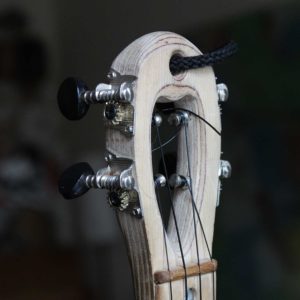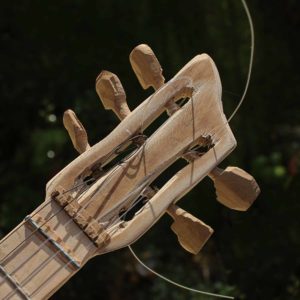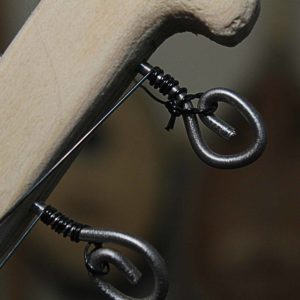Tuners are responsible for adjusting the tension of the strings.
Bought tuners
When you want to do a more „professional“ guitar and your main focus is not to make everything yourself and 100% no-budget, than I actually would recommend buying them. It’s definitely more relaxed to tune your instrument with them. Still, they are maybe even not the most simple solution, when it comes to the installation, because you need to work a bit more precise when drilling the holes.
- Most accurate tuning, easy handling.
- If your instrument is out of tune, it will not be their fault 😉 (They keep the tuning)
- Recommended for metal strings, as they can handle hard tension best.
- You need to buy or plinder them from a broken guitar
Wooden direct mechanics
Good old classical. You can make them completely yourself out of hard wood. It is possible to make them just with a saw and some sanding, but to make them properly and well tunable, special tools (something like a huge pencil sharpener) are needed.
The tuner gets slightly thinner, at the end. Like this, it will not get loos, even if it gets turned lot in the hole.
- Can be done for free!
- Done pretty easily, but just with special tools
- If they are not well-made, it’s a pain in the ass to tune the instrument
- To precisely shape them, a special tool is needed
Metal direct mechanics
Fence wire, clothes horse… useful wire is always around. Two/ three millimeters is a nice diameter. Thicker is mostly hard to bend, thinner gets a bit weak or doesn’t hold well in the wood anymore.
- As they have a smaller diameter as wooden mechanics, they are less sensitive when it comes to tuning, so it’s easier to tune precisely
- Fast and easy to create and to attach! The workflow is excellent.
- Can lose the tuning, when the holes are not tight enough.
- Low comfort when attaching the strings, but no magic either


